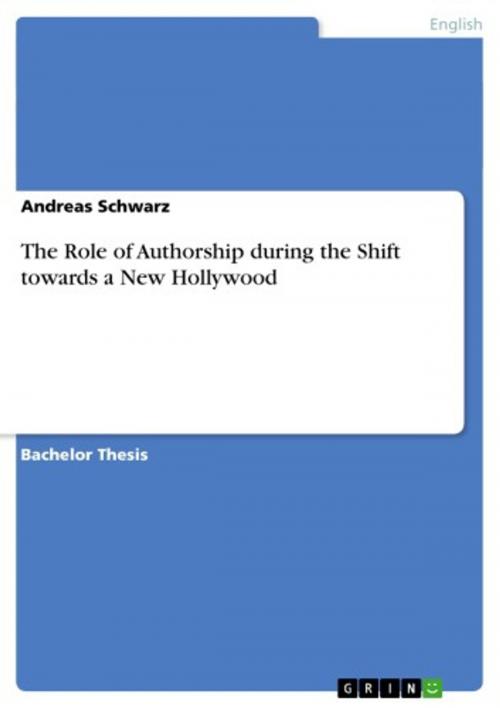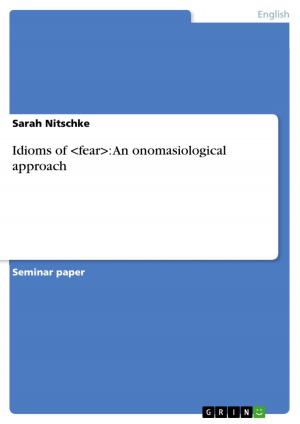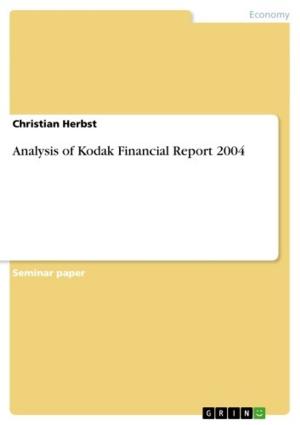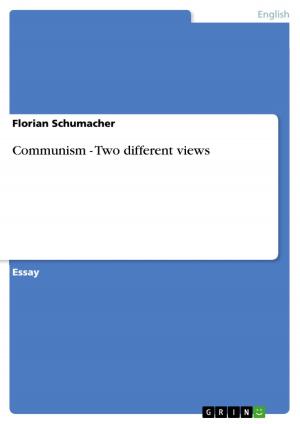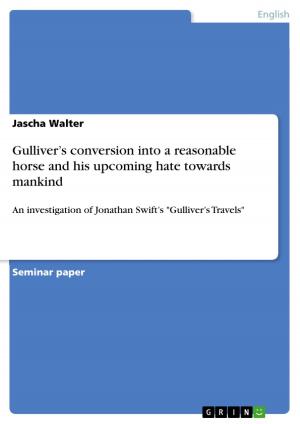The Role of Authorship during the Shift towards a New Hollywood
Nonfiction, Entertainment, Drama, Anthologies| Author: | Andreas Schwarz | ISBN: | 9783656097839 |
| Publisher: | GRIN Publishing | Publication: | January 10, 2012 |
| Imprint: | GRIN Publishing | Language: | English |
| Author: | Andreas Schwarz |
| ISBN: | 9783656097839 |
| Publisher: | GRIN Publishing |
| Publication: | January 10, 2012 |
| Imprint: | GRIN Publishing |
| Language: | English |
Bachelor Thesis from the year 2011 in the subject American Studies - Culture and Applied Geography, grade: 1,3, Free University of Berlin (John-F.-Kennedy-Institut), language: English, abstract: In film studies, the term New Hollywood is used in non-conclusive and heterogeneous ways. The discourse does not make explicit what the real New was. However, there appears to be a general consensus as to the actual time frame in which a bigger change happened in Hollywood that stirred up the system - starting in 1967. Scholars have been trying to explain the proclaimed change of the Classical Hollywood Cinema from different perspectives, which, depending on author and release date, point out economical, production-related, societal, or creative-aesthetic revolutions as responsible factors. Coming from the film critic's angle towards New Hollywood, the most important factor in the process was the development and success of the American auteur. The auteur theory has been appointed as such by film critic Andrew Sarris, who based his assumptions mainly on the theoretical conclusions drawn by the writers of the French Cahiers du Cinema. Taking the auteur approach to explain aspects of the New Hollywood, some scholars pinpoint the era down to the years of 1967-1976. This national cinematography is hardly discussed consensually within its own historiographical discourse or the boundaries of text analysis. I want to specifically trace the role of the idea of an auteur cinema within the Hollywood industry during this change, and thereby further disentangle the complex relationship of commerce and authorship. My first chapter will therefore be employed with the theoretical background and the discourse around authorship in general, film in particular. Eventually this will lead to a clear idea about the specifics and limitations of the auteur theory discourse. The second chapter will then be occupied with the historical change of the Hollywood system in the sixties and seventies of the twentieth century, and will aim to define the contributing factors for this change within and outside the industry. In terms of terminology, a historiographical approach will determine the rather different meanings of New Hollywood and Hollywood Renaissance. Chapter three will tie up the loose ends of both previous chapters, striving to identify what kind of influence on film production the auteurs of New Hollywood had in terms of the reinvigorated success of the American film industry or if they were auteurs at all for that matter. What room is there in a system which is based on its own myths of star power etc. for the serious artistic vision of the individual?
Bachelor Thesis from the year 2011 in the subject American Studies - Culture and Applied Geography, grade: 1,3, Free University of Berlin (John-F.-Kennedy-Institut), language: English, abstract: In film studies, the term New Hollywood is used in non-conclusive and heterogeneous ways. The discourse does not make explicit what the real New was. However, there appears to be a general consensus as to the actual time frame in which a bigger change happened in Hollywood that stirred up the system - starting in 1967. Scholars have been trying to explain the proclaimed change of the Classical Hollywood Cinema from different perspectives, which, depending on author and release date, point out economical, production-related, societal, or creative-aesthetic revolutions as responsible factors. Coming from the film critic's angle towards New Hollywood, the most important factor in the process was the development and success of the American auteur. The auteur theory has been appointed as such by film critic Andrew Sarris, who based his assumptions mainly on the theoretical conclusions drawn by the writers of the French Cahiers du Cinema. Taking the auteur approach to explain aspects of the New Hollywood, some scholars pinpoint the era down to the years of 1967-1976. This national cinematography is hardly discussed consensually within its own historiographical discourse or the boundaries of text analysis. I want to specifically trace the role of the idea of an auteur cinema within the Hollywood industry during this change, and thereby further disentangle the complex relationship of commerce and authorship. My first chapter will therefore be employed with the theoretical background and the discourse around authorship in general, film in particular. Eventually this will lead to a clear idea about the specifics and limitations of the auteur theory discourse. The second chapter will then be occupied with the historical change of the Hollywood system in the sixties and seventies of the twentieth century, and will aim to define the contributing factors for this change within and outside the industry. In terms of terminology, a historiographical approach will determine the rather different meanings of New Hollywood and Hollywood Renaissance. Chapter three will tie up the loose ends of both previous chapters, striving to identify what kind of influence on film production the auteurs of New Hollywood had in terms of the reinvigorated success of the American film industry or if they were auteurs at all for that matter. What room is there in a system which is based on its own myths of star power etc. for the serious artistic vision of the individual?
